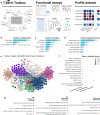Sperm Toolbox-A selection of small molecules to study human spermatozoa
- PMID: 38377053
- PMCID: PMC10878532
- DOI: 10.1371/journal.pone.0297666
Sperm Toolbox-A selection of small molecules to study human spermatozoa
Abstract
Male contraceptive options and infertility treatments are limited, and almost all innovation has been limited to updates to medically assisted reproduction protocols and methods. To accelerate the development of drugs that can either improve or inhibit fertility, we established a small molecule library as a toolbox for assay development and screening campaigns using human spermatozoa. We have profiled all compounds in the Sperm Toolbox in several automated high-throughput assays that measure stimulation or inhibition of sperm motility or the acrosome reaction. We have assayed motility under non-capacitating and capacitating conditions to distinguish between pathways operating under these different physiological states. We also assayed cell viability to ensure any effects on sperm function are specific. A key advantage of our studies is that all compounds are assayed together in the same experimental conditions, which allows quantitative comparisons of their effects in complementary functional assays. We have combined the resulting datasets to generate fingerprints of the Sperm Toolbox compounds on sperm function. The data are included in an on-line R-based app for convenient querying.
Copyright: © 2024 Gruber et al. This is an open access article distributed under the terms of the Creative Commons Attribution License, which permits unrestricted use, distribution, and reproduction in any medium, provided the original author and source are credited.
Conflict of interest statement
The authors have declared that no competing interests exist.
Figures



References
-
- Faber EB, Wang N, John K, Sun L, Wong HL, Burban D, et al.. Screening through Lead Optimization of High Affinity, Allosteric Cyclin-Dependent Kinase 2 (CDK2) Inhibitors as Male Contraceptives That Reduce Sperm Counts in Mice. J Med Chem. 2023;66(3):1928–40. doi: 10.1021/acs.jmedchem.2c01731 - DOI - PMC - PubMed
MeSH terms
LinkOut - more resources
Full Text Sources

